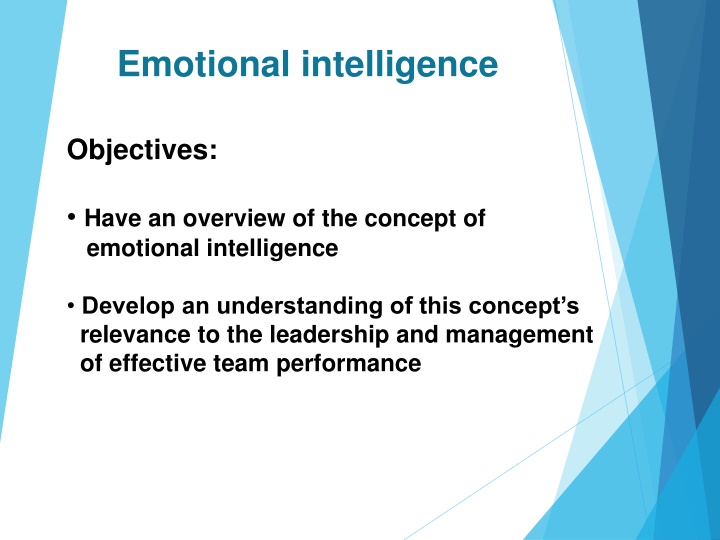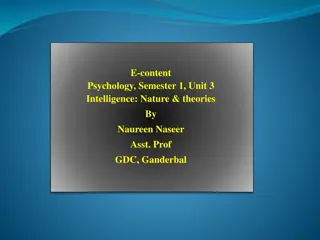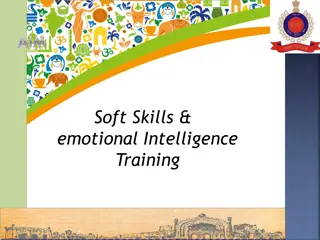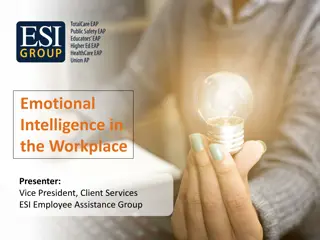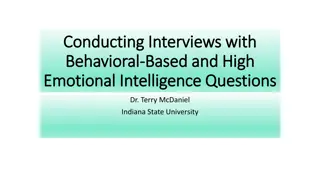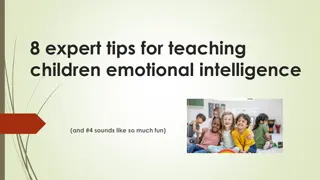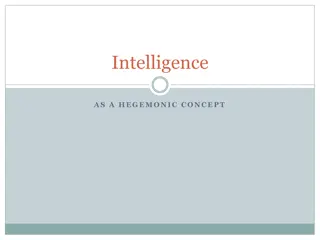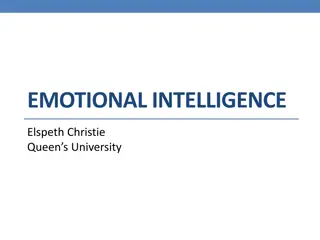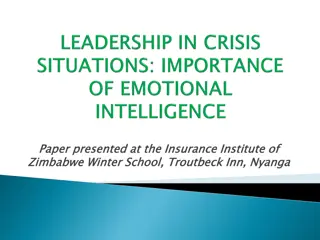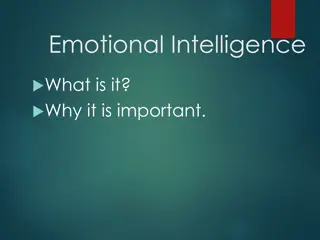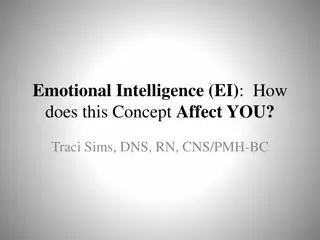The Importance of Emotional Intelligence in Social Care and Health Leadership
Emotional intelligence plays a vital role in the effective leadership and management of team performance in social care and health settings. Leaders must navigate challenging emotions such as shame, distress, and anger while fostering trust, cooperation, and support among team members. By understanding and managing emotions, leaders can enhance team dynamics, resilience, and overall outcomes in complex and demanding situations.
Download Presentation

Please find below an Image/Link to download the presentation.
The content on the website is provided AS IS for your information and personal use only. It may not be sold, licensed, or shared on other websites without obtaining consent from the author.If you encounter any issues during the download, it is possible that the publisher has removed the file from their server.
You are allowed to download the files provided on this website for personal or commercial use, subject to the condition that they are used lawfully. All files are the property of their respective owners.
The content on the website is provided AS IS for your information and personal use only. It may not be sold, licensed, or shared on other websites without obtaining consent from the author.
E N D
Presentation Transcript
Emotional intelligence Objectives: Have an overview of the concept of emotional intelligence Develop an understanding of this concept s relevance to the leadership and management of effective team performance
Emotional intelligence Key authors: Goleman (1996) Salovey and Mayer (2004) Bradberry and Greaves (2009)
Emotional intelligence The concept of emotional intelligence has been widely applied to: Leadership and management Social care and health Education
Why is emotional intelligence relevant to the leadership and management of effective team performance in social care and health? Leaders and managers of social care and health teams and the individuals that they work with may need to work with challenging emotions such as: Shame, indignity, disgust, hatred Distress, sorrow, grief, misery, dismay Panic, dread, terror, fright, shock Anxiety, shame, embarrassment, humiliation, fear Anger, rage, resentment, irritation, annoyance
Why is emotional intelligence relevant to the leadership and management of effective team performance in social care and health? Social care and health leaders and managers need to have personal qualities that generate trust in team members and other individuals so that they: Trust the team leader and manager to support and advise them Co-operate with the team leader and manager to deliver person centred services and citizen focused outcomes for individuals Maintain contact with the team leader and manager as required including a feeling that they can be honest when things go wrong
Why is emotional intelligence relevant to the leadership and management of effective team performance in social care and health? Leaders and managers of social care and health teams have to manage complex and challenging situations which can impact on their emotions as well as those of others, for example: A staff member who has supported an individual through a traumatic event is extremely upset and they need your support as their manager your emotional intelligence may help you to understand their distress; it may also contribute towards your resilience as you understand and manage your own emotional response to the situation.
Why is emotional intelligence relevant to the leadership and management of effective team performance in social care and health? Leaders and managers of social care and health teams have to manage complex and challenging situations which can impact on their emotions as well as those of others, for example: A team member phones in sick for the third time on a Monday this month when you are already overstretched your emotional intelligence may help you to keep your emotions in check as opposed to you losing your temper, avoiding the risk that you face a grievance being submitted against you for bullying, as you seek to investigate the cause of these persistent absences after the weekend.
What could happen if you dont have emotional intelligence as a team leader and manager in social care and health? You could alienate your team members by acting in a way that does not display empathy or understanding. You could make matters worse by making your team member feel that the person who is meant to lead and guide them does not understand them and the challenges of their role.
What could happen if you dont have emotional intelligence as a team leader and manager in social care and health? You lose contact with your team member even when you see them, e.g. they do not attend or engage in team meetings and they leave their job through a feeling that they do not belong . There is a lack of modelling for other leaders, managers and staff which continues to promote an organisational culture where there is no emotionally intelligent way of working, to the detriment of individuals accessing, using and delivering social care and health services.
So what is emotional intelligence? It is an ability to understand yourself and others as emotional beings. The emotionally intelligent team leader and manager understands that emotions affect behaviour, beliefs, perceptions, thoughts and actions. The emotionally intelligent team leader and manager has the ability to adjust and regulate their emotions during communication with others this is a key element of emotional intelligence and it is possible to develop your skills in this area.
Emotional intelligence (Bradberry and Greaves, 2009) Bradbury and Greaves (2009) identified four emotional intelligence skills paired under two primary competencies which are personal and social competence. Personal competence: This is made up of self-awareness and self-management skills which focus on you as opposed to your interaction with people; it is about who you are . Personal competence includes the ability to stay aware of your emotions and manage your behaviour and tendencies, e.g. a tendency to raise your voice if you are angry or giggle inappropriately when you are nervous.
Emotional intelligence (Bradberry and Greaves, 2009) Social competence: This involves social awareness and the presence of relationship management skills, such as those that you may use to communicate with your team members. For example, greeting a member of your team rather than failing to acknowledge them when you come into work. It conveys the ability to understand other people s moods, behaviour and motives to improve the quality of your relationship with others, such as between yourself and your team members. For example, noticing that a member of your team is unusually quiet and looking sad.
Emotional intelligence (Bradberry and Greaves, 2009, p. 24)
Bradberry and Greaves, 2009, p. 63 Self-awareness strategies Stop considering emotions to be good 'or bad . Be aware of how your emotions are affecting you physically, e.g. you know that you are irritable when you are tired. Know who and what pushes your buttons . Keep a journal to help you reflect upon your emotions during your working practice, especially as a new team leader and manager you may want to share this with a mentor at a later date or look back on it later. Be aware of how you react to stress. Recognise what is important to you, i.e. your values.
Some self-management strategies (Bradberry and Greaves, 2009, p.100) Pause and remember to breathe on emotion or reason? Ask the question, is my communication based Count to ten Seek out a mentor who has faced these situations Speak to someone who is not emotionally involved Remove yourself from the situation Learn from the situation
Social awareness strategies (Bradberry and Greaves, p. 138) Watch body language Develop active listening skills (Moss, 2012) Have awareness of the context within which your communication is taking place, e.g. is now a good time to have that supervision meeting or should you set aside a specific space and time away from the building? Be aware of the mood/atmosphere in the room
Relationship management Relationship management co-ordinates the previous three emotional intelligence skills (self-awareness, self-management and social awareness). It is an ability to use your awareness of your emotions, as well as those of others to manage relationships, to ensure clear communication and the effective handling of conflict. Relationship management is particularly critical within stressful situations and so very relevant to your leadership and management of teams in social care and health.
Relationship management strategies (Bradberry and Greaves, 2009, p. 179) Build trust and know that this is earned and not an automatic right for any team leader and manager. if you disagree with them. Acknowledge the other person s feelings even Be prepared to have difficult conversations. Accept that you may not always be liked by team members if you have to make unpopular decisions.
Relationship management strategies (Bradberry and Greaves, 2009, p. 179) Build upon your strengths in terms of your communication this is particularly useful in team situations. Avoid giving mixed signals by being clear about your remit, including the policies and procedures that govern your decision making. Be prepared to take feedback well including criticism it is ok to be regarded as human and get things wrong sometimes when leading and managing a team; you may have to apologise from time to time.
We hope that you have gained some insight into emotional intelligence
References Bradberry, T. and Greaves, J. (2009) Emotional intelligence 2.0. San Diego, CA: Talent Smart. Goleman, D. (1996) Emotional intelligence: why it can matter more than IQ. London:Bloomsbury. Goleman, D., Boyatzis, R. and McKee, A. (2002) The new leaders. London: Bloomsbury. Howe, D. (2008) The emotionally intelligent social worker . Basingstoke;New York: Palgrave Macmillan. Hughes, M., Patterson, L. and Terrell, J. (2005) Emotional intelligence in action. San Fransico:Pfeiffer 2005. Moss, B. (2012) Communication skills in health and social care. London: Sage. Salovey and Mayer (2004) What is emotional intelligence? in Salovey, P., Brackett, M. and Mayer, J. (eds.) Emotional intelligence: key readings on the Mayer and Salovey model. Dude Publishing: New York, pp. 29- 47. Social Care Wales (2016) First steps in management. Social Care Wales.
